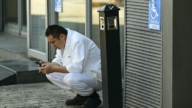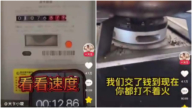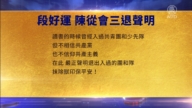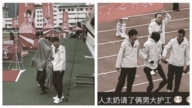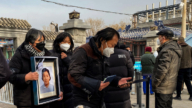【新唐人2014年09月08日訊】中共國務院9月4日宣佈將推出「高考改革方案」,主要有十點舉措。包括增加全國統一命題的省份,減少體育藝術特長加分項目,不分文理科,高考總成績由三門統一高考分數加三門高中學科分數等。大陸中學教師分析說,雖然這些嚐試是有益的,但是改變不了應試教育的根本弊端,也未實現考生之間的公平競爭。
改革方案當中最受人關注的,是高考成績「3+3」方案。也就是高考總成績,由統一高考的語文、數學、外語3個科目的成績,和「高中學業水平考試」3個科目成績組成。高考中,語文、數學、外語科目不變、分值不變,不分文理科,外語科目提供兩次考試機會。而「高中學業水平考試」科目將由學生在思想政治、歷史、地理、物理、化學、生物等科目中自主選擇。
上海、浙江將在今年分別出臺高考綜合改革試點方案,從今年秋季入學的高一學生起開始實施。作為其他省市高考改革參考。
蘇州某中學語文教師袁雪成認為,儘管這種嚐試是有益的,但是對於應試教育的弊端,並沒有大的改變。
蘇州某中學教師袁雪成:「 高考指揮棒的作用,對中學,小學,甚至幼兒園的影響太大。為甚麼呢?因為高考,比如說,你這樣考後面肯定要影響到怎麼教,怎麼學,怎麼複習這個問題。然後初中,小學也跟著它,甚至幼兒園也跟著它。我以後要高考的,我就要照這方面學之類的,這個影響太大。」
袁雪成認為,應該是高考圍繞中小學的學習來考試,而不是反過來。他建議,公立學校只需按照教學大綱來組織教學,而不是以高考為目標。公立學校應該把教學跟高考脫鉤。高考的培訓讓社會和民辦學校承擔。
陝西國企職工李毓的孩子明年即將參加高考。李毓認為,雖然具體的方案比以前相對有一些進步,但是只要這個體制不改,那麼所有治標不治本的東西,仍然會流於「上有政策,下有對策」。如果所有的教育沒有自由,仍然是應試教育的話,所有這些舉措,最終都是形式。
在促進公平方面,這次改革方案提出,提高中西部地區人口大省的高考錄取率。在異地高考問題上,則提出,從明年起增加使用全國統一命題試卷的省份,這樣在全國範圍內,會有更多省份之間的考生,可以異地高考。
但是根據「學而思高考研究中心」教師王宏斌分析說,北京目前使用的「北京卷」,除北京外,沒有其他省份在使用。並且,北京的高考政策結合戶籍制度,使得從鄉鎮進城工作人員的「隨遷子女」,只能參加高等職業學校招生考試。因此從理論上,目前北京難以實現異地高考。
如何保證公平競爭又減輕學生負擔?在中國這兩個目標之間存在著矛盾。如果沿用「一考定終身」的方式,給學生的壓力太大。但是如果高考參照平日成績,權貴者就更容易作弊,和以權謀私。李毓認為,高考種種的問題和矛盾,最終指向制度,也指向道德下滑。
陝西國企職工李毓:「 所有好的政策,在這種環境下,在這種人心已經不古的,道德底線一再被突破的大環境下,很多良好的舉措都不可能最終收到你預期的效果。 我總覺得,現在全國像一盤亂棋,任何事情都是錯綜複雜的。假如你就是找到制度的根源,但是制度你又怎麼去恢復它呢?」
李毓又表示,解決矛盾的唯一辦法,就是要把教育領域放開,國家不要壟斷學歷,允許民間自主辦學,教育資源也不要集中配置,要均勻分佈,讓偏遠地區的孩子得到起碼的教育資源。
香港媒體評論說,這種朝令夕改式的改革,被一小部份輿論左右,受既得利益階層所綁架。 而最大的不幸就是莘莘學子,他們疲於應付、疲於奔命。
採訪編輯/秦雪 後製/蕭宇
Will New College Entrance Exam Bring Reform?
Sept 4, the party’s State Council announced a reform plan
on the College Entrance Examination (CEE),
which includes 10 moves.
Among them are increasing the number of provinces
that employ unified exam papers,
decreasing projects that offer bonus points on sports and art,
stopping the differentiation of liberal arts and science,
and the total CEE score being composed of 3 required subjects
and 3 optional subjects from the Academic High School Test.
Some middle school teachers commented that the reform
might be beneficial but won’t completely change
the disadvantages of the exam-oriented education system;
neither will it realize fair competition among candidates.
The conspicuous point in the reform plan is the “3+3″ plan.
The total CEE score will be the sum scores
of the 3 required subjects
“Chinese", “Mathematics" and “Foreign Language"
from the unified national CEE
and scores of another 3 optional subjects
from the High School Academic Test.
“Chinese", “Mathematics" and “Foreign Language"
will stay the same in the new CEE system,
but the exam on ‘Foreign Language"
will be offered twice instead of once.
For the other 3 subjects, students can choose from
Politics, History, Geography, Physics, Chemistry or Biology.
The new system will be tested in Shanghai and Zhejiang
this year.
It』ll apply to the high school students who enroll this autumn.
The experiences in Shanghai and Zhejiang will serve
as a reference to other provinces.
Yuan Xuecheng, a mainland middle school teacher
said that even if the reform may be beneficial,
it won’t completely change the disadvantages of the
examination-oriented education system.
Yuan Xuecheng: “The CEE system severely influences
middle school, elementary,and even kindergarten education.
For example, how CEE will be tested will influence
how teachers teach, how students learn and
review the knowledge in all the pre-high school education.
It’s like I am going to be tested in the CEE
so I need to study this way.
The influence is very significant."
Yuan said that the CEE should be determined by
pre-high school education; it shouldn’t be the other way round.
He said public schools should just follow a teaching syllabus
instead of aiming at the CEE.
Li Yu, working in a state-run enterprise,
has a child who will take the CEE next year.
Li stated that even if the reform plan has advantages,
as long as the political system is not reformed,
it won’t eradicate the problem essentially.
It will end up being fruitless.
If there is no freedom in education
and the exam-oriented education system continues,
all these reforms are only scratching the surface.
As for promoting fairness and equity,
the reform proposes to increase the enrollment rate
in the densely-populated provinces in the middle-west.
As for taking the exam from different provinces,
the reform proposes to increase the number of provinces
that employ national unified exam papers.
In this way, students can take the exam in various places.
Wang Hongbin, a teacher from “Xue Er Si CEE Research Center",
said that right now Beijing is using “Beijing CEE papers"
and all other provinces aren’t using Beijing’s exam papers.
Beijing’s policy is combined with the household registration
system.
Children of those who work in Beijing but registered
elsewhere
can’t take the CEE in Beijing but vocational college
entrance exams.
So it’s hard for students from other provinces
to take the CEE in Beijing.
How to ensure fair competition and relieve students’ workload?
In China, these two targets produce conflicting results.
The way “one exam determines a person’s whole life"
really gives students tremendous pressure.
But, if the CEE refers to students’ everyday performance,
it』ll be a lot easier for those who hold power and wealth
to indulge in corrupt practices.
Li Yu stated that all problems and conflicts regarding CEE
Li Yu: “In this environment, when public morality
is not what it used to be and the moral bottom line
has dropped again and again,
all good policies can’t be as effective as you’d expect.
I feel like right now the whole country is in a chaos.
A lot of things are complicated and entangled together.
When tracking back to the source of the regime,
how can you fix it then?"
Li Yu also stated that the only way to solve the problem is to
stop government from monopolizing education resources.
Private schools should be promoted.
Education resources should be evenly distributed
instead of being centralized.
Thus, children living in remote and isolated areas
can enjoy basic education resources as well.
Hong Kong media commented that
the constantly changing reform
is influenced by a small group of people
and is also being hi-jacked by interest groups.
The least fortunate are the students who struggle to keep up.
Interview & Edit/Qinxue Post-Production/XiaoYu





